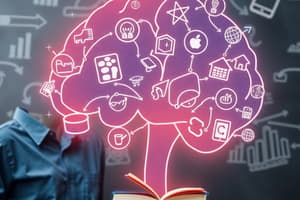Podcast
Questions and Answers
¿Qué es la psicología?
¿Qué es la psicología?
- El estudio del comportamiento humano y los procesos mentales. (correct)
- El estudio de la biología humana
- El estudio de la historia de la humanidad
- El estudio de la economía humana
¿Qué estudia la Psicología Educativa?
¿Qué estudia la Psicología Educativa?
- El desarrollo humano en la salud pública
- La optimización de aprendizajes en la familia
- El aprendizaje y desarrollo humano en educación. (correct)
- La instrucción del personal militar.
True or false:La Psicología Educativa solo se aplica en el contexto escolar.
True or false:La Psicología Educativa solo se aplica en el contexto escolar.
False (B)
True or false:La Psicología Educativa solo se aplica en el contexto escolar.
True or false:La Psicología Educativa solo se aplica en el contexto escolar.
¿Cuál es el objetivo principal de la Psicología Educativa?
¿Cuál es el objetivo principal de la Psicología Educativa?
¿En qué otros contextos se aplica la Psicología Educativa?
¿En qué otros contextos se aplica la Psicología Educativa?
¿Qué es el conductismo?
¿Qué es el conductismo?
¿En qué otros contextos se aplica la Psicología Educativa además del ámbito escolar?
¿En qué otros contextos se aplica la Psicología Educativa además del ámbito escolar?
True or false: Antes de intervenir en dificultades de comunicación en niños, se debe analizar su evolución y si hay algún trastorno asociado.
True or false: Antes de intervenir en dificultades de comunicación en niños, se debe analizar su evolución y si hay algún trastorno asociado.
True or false: La Psicología Educativa solo se enfoca en la instrucción del profesorado.
True or false: La Psicología Educativa solo se enfoca en la instrucción del profesorado.
¿Qué es la psicología cognitiva?
¿Qué es la psicología cognitiva?
¿Qué relación tienen el desarrollo humano y la educación?
¿Qué relación tienen el desarrollo humano y la educación?
¿Cómo se relaciona la Psicología Educativa con la innovación en modelos y técnicas de enseñanza?
¿Cómo se relaciona la Psicología Educativa con la innovación en modelos y técnicas de enseñanza?
True or false: El objetivo principal de la Psicología Educativa es el desarrollo humano.
True or false: El objetivo principal de la Psicología Educativa es el desarrollo humano.
True or false: La Psicología Educativa no se relaciona con la innovación en modelos y técnicas de enseñanza.
True or false: La Psicología Educativa no se relaciona con la innovación en modelos y técnicas de enseñanza.
¿Qué es la psicología humanista?
¿Qué es la psicología humanista?
¿Qué es la psicología del aprendizaje?
¿Qué es la psicología del aprendizaje?
¿Qué es la psicología del desarrollo?
¿Qué es la psicología del desarrollo?
¿Qué es la psicopatología?
¿Qué es la psicopatología?
¿Qué es la psicología de la personalidad?
¿Qué es la psicología de la personalidad?
¿Qué es la psicología aplicada?
¿Qué es la psicología aplicada?
Flashcards are hidden until you start studying
Study Notes
- The text discusses the main schools or trends in the history of psychology.
- The list of schools or trends is exhaustive.
- The text does not provide specific details about the schools or trends.
- No date is mentioned in the text.
- The history of psychology includes various schools of thought and approaches.
- The associationism principle states that everything is known through the senses.
- Functionalism focuses on the functions of the mind rather than its structures.
- Structuralism emphasizes the analysis of the elements of consciousness.
- Psychoanalysis explores the unconscious mind and its influence on behavior.
- Behaviorism studies observable behavior and its environmental determinants.
- Gestalt psychology examines the organization of perception and the whole experience.
- Cognitive psychology studies mental processes involved in knowledge, perception, memory, and reasoning.
- Humanistic psychology emphasizes personal growth and self-actualization.
- Psychobiology studies behavior and mental processes from a biological perspective.
- Psychology is the study of human behavior and mental processes.
- The field has incorporated advances in neuroscience through neuropsychology and cognitive neuroscience.
- Learning is a key area of study in psychology, involving language, thought, memory, and attention.
- The psychology of learning is important in education and considers factors such as motivation, interests, and needs of students.
- Developmental psychology studies the changes that occur in individuals throughout their lives, including physical, intellectual, emotional, sexual, social, and moral development.
- The study of abnormal behavior and mental disorders is known as psychopathology.
- Psychology of art explores the creation and perception of art from a psychological perspective.
- Personality psychology studies the organized set of traits that characterize an individual's behavior over time.
- There are three valid models for the study of personality: clinical, correlational, and experimental.
- Applied psychology includes various areas of psychology that have practical applications.
- Applied psychology focuses on problem-solving and optimization of human processes for professional purposes.
- The main branches of applied psychology are clinical, educational, organizational, and community.
- Clinical psychology deals with mental suffering and disorders, using interviews and psychological tests.
- Educational psychology studies learning and teaching techniques to improve human education.
- Child psychology studies the behavior and development of children from birth to adolescence.
- Social psychology investigates human interaction, particularly in groups and social situations.
- Industrial/organizational psychology studies human behavior in professional and organizational contexts.
- Community psychology works with populations to satisfy their vital needs, such as health, education, and housing.
- Forensic psychology involves evaluations of defendants' capacity, reports to judges and lawyers, and testimony in court.
- Sports psychology studies the psychological factors associated with sports participation and performance.
Studying That Suits You
Use AI to generate personalized quizzes and flashcards to suit your learning preferences.




